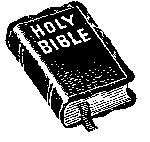Cleanliness is...
Things
NOT found in the Bible, part 1
Series Introduction
Over the next several weeks
we’re going to ask the question, “Is that in the Bible?” We’ll look at some
things that people think are in the bible and then we’ll look at some things
that people may not have realized are in the bible. This first group are things
that you won’t find in the bible.
Introduction
Many statements people have
made over the years they claim come from the bible; usually by saying, “That’s
in the bible!” But when challenged, they couldn’t tell you where it’s found in the
scriptures.
One of the things that I’ve
learned, early on when I became a Christian, is to demand book, chapter, and
verse for the things that we believe in. If it is in scriptures, they should be
able to show you where it is.
Wash Your Hands
One of the first things we’re taught as children is to wash our hands before a meal. Even if we didn’t play outside, or get dirt on them, our mothers would tell us to get cleaned up before coming to the table.
Of course, if we were
stubborn about it (and we usually are) we’ll challenge our mothers for a reason
(always a bad thing). Mothers will usually reply with the statement,
“Cleanliness is next to Godliness”.
But is that in the bible?
Surely if our mothers make that statement, it must be in there. Usually, this
statement would make us change our minds about washing up and we’ll go and do
it. After all, God is referenced in the statement; it has to be true.
It’s not in the bible at
all. The closest you’ll come to this statement is a song lyric by a band
called, Smashing Pumpkins. However, let’s look at what’s actually found
in the bible in regards to this scenario…
The Elders’ Traditions
In the New Testament, a
scene is found discussing cleanliness. In Mark 7:5 it states, Then the Pharisees and scribes
asked Him, “Why do Your disciples not walk according to the tradition of the
elders, but eat bread with unwashed hands?” You will note the
Pharisees’ statement, ‘the tradition of the elders.’ Already, you can conclude
that this conversation has nothing to do with the Law of Moses; instead, it’s
what the ‘learned men’ of Israel had invented. Looking at the previous four verses;
you’ll read of this tradition.
Essentially, what the
Pharisees are saying is that, while in the marketplace, you may have touched
something that gentile has touched or brushed against someone who is a gentile
or (gasp!) a Samaritan. From this, you would be considered unclean and
need to “scrub up”.
Clean Inside and Out
Jesus’ response to this can be found in verses 6-7, He answered and said to them, “Well did Isaiah prophesy of you hypocrites, as it is written: 'This people honors Me with their lips, But their heart is far from Me. And in vain they worship Me, Teaching as doctrines the commandments of men.'”
In Mt. 23, known as the
‘Chapter of Woes’, Jesus calls out the pharisees and scribes; calling them
hypocrites and listing their so-called doctrines. In verse 23, of Matthew, he
states, “Woe to you,
scribes and Pharisees, hypocrites! For you pay tithe of mint and anise and
cummin, and have neglected the weightier matters of the law: justice and mercy
and faith. These you ought to have done, without leaving the others undone.”
The Scribes and Pharisees
were more concerned about outward appearances, and traditions, that they
ignored the matters of the Law; which was to be well-known to them (Deut.
6:4-9).
Conclusion
As Paul wrote in Colossians
2:8, Beware lest
anyone cheat you through philosophy and empty deceit, according to the
tradition of men, according to the basic principles of the world, and not
according to Christ.
I’m not stating that you
should challenge your mother in her statement to you, but to make sure that do
things according to scripture and not according to the traditions of men.






Comments
Post a Comment